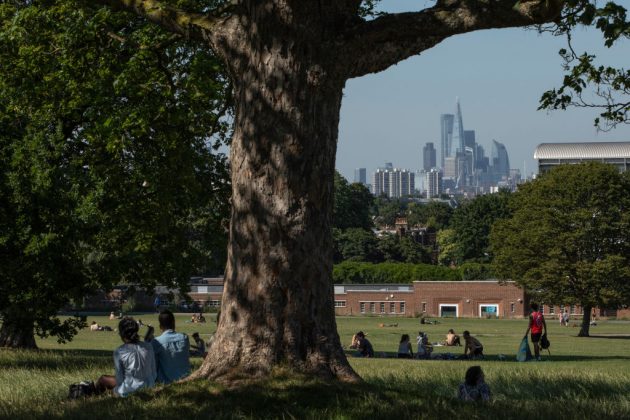A catch-up strategy? How Government can give young Brits a boost in Budget 2021

The costs of Covid-19 have fallen on all parts of society.
Deaths have hit hardest amongst the elderly – but shielding individuals, disabled Brits and others have had a tougher time of it than even those unable to hug their family or stuck with Netflix ennui.
But the economic consequences, in the short-, medium- and long-term, are most likely to be felt by those at the start of their working lives.
Of the job losses recorded since the start of the pandemic, more than four in five have been amongst those under 35. That number will almost certainly rise – a further 1.75m are still enrolled on the furlough scheme.
At the same time, property prices have continued to grow, by an average of 7.5 per cent according to the closely-watched Nationwide tracker, significantly outstripping earnings growth and bad news for those pushed even further away from the prospect of getting onto the property ladder.
And in the long term, the vast increase in public debt will saddle many of today’s youngsters with a higher tax burden (or less cash for public services) for decades to come.
Add all of this up and combine it with career development issues and it’s obvious why the economic wonks at the Institute of Fiscal Studies say the “pandemic has severely dented the career prospects of young people and threatens to have a prolonged negative impact on them as a result.”
Meanwhile, briefings out of HM Treasury suggest that the pensions triple lock – ensuring payouts to pensioners’ go up each year at the highest of three measures – will remain in place.
So, locked out of the property market, more likely to have been made unemployed and unlikely to keep more of their money even when they manage to make it. No wonder some ask if today’s younger generations will be the first to be less wealthy than their parents.
Read more: Squeamish ministers must include casual sex exemption in lockdown roadmap
So what can be done? Chancellor Rishi Sunak has an early chance to add a ‘catch-up’ strategy to the Government’s levelling-up agenda in next week’s Budget. But what would that look like?
Short-term salvation
Most economists and analysts hope that support for the younger generation will come in two parts – short-term measures that can alleviate the worst of the financial pressure on twenty-somethings today, and then more longer-term structural measures which can pay off in the longer run.
“Decades of falling home ownership and an economic shock focused on social sectors like hospitality and leisure has meant that young people today are at the heart of both a rent arrears crisis, and worklessness crisis,” Kathleen Henehan, senior policy analyst at think-tank the Resolution Foundation, told City A.M.
To alleviate the former, they propose a tenant loan system so that debts can be repaid in a way that avoids mass evictions.
Others take a more radical approach. Both the Institute for Economic Affairs (IEA) and the TaxPayers’ Alliance reckon a temporary tax cut is the way forward.
Len Shackleton, editorial and research fellow at the IEA, said such a move would slightly redress the ‘generation gap.’
The Chancellor should, he said, “abolish or significant reduce national insurance contributions for 16-24 year-olds for a two-year period.”
“This would increase their take-home pay and/or improve their job chances. This could be offset by imposing National Insurance on those past state pension age.”
The latter move would be controversial, but as a generational book-balancer, it has its merits.
John O’Connell, chief executive at the TaxPayers’ Alliance, goes further.
“Rishi Sunak could revive the economy by scrapping employer’s National Insurance and replacing it with a temporary payroll tax. This could cut the salary bill for a company with 50 employees by £70,000,” he tells me.
Read more: UK Covid alert level downgraded as hospital pressure eases
The Centre for Policy Studies took a similar tack, proposing a liberalisation of the rules around the nighttime economy.
In particular the think-tank put making life easier for bars and pubs to stay open later will have positive consequences on pay cheques for early-career bartenders and chefs.
Whereas Warwick Lightfoot, head of economics at Policy Exchange, thought the Covid-19 crisis was a chance to put rocket boosters under the entrepreneurship economy.
“Young people could be helped if those with a viable business idea and access to £2,000 of start-up capital were given a fixed allowance of £100 per week for 12 months, business mentoring, and access to start-up loans,” he told City A.M.

Building long-term remedies
Many of the worst impacts of the economic bomb dropped on those at the start of their careers will not be felt for a while.
But the biggest issue may well be one that has been on policymakers’ agenda from long before the pandemic hit.
The UK, simply put, does not build enough houses in the right places. That’s particularly true in London which, despite some dampened demand during the pandemic will maintain its gravitational pull as the place successful people want to live and work.
A grand total of 35,959 ‘new additional dwellings’ were started in the 32 boroughs of the capital in 2018/19 – the Government reckons 72,000 were required.
That, unsurprisingly, increases the price of property; good for the property-owning, not so for the property-less.
Historically low interest-rates and cheap money have exacerbated the problem, with those able to remortgage from a higher base taking advantage. Those saving for that elusive first deposit, meanwhile, get only a miniscule reward for their efforts to squirrel away a few quid; that, inevitably, makes things even harder.
Read more: London house prices: What £500k gets you in tube zones 1 to 6
So why don’t we build houses?
There’s a variety of reasons, but the planning system is one. Today – as we know from the entertainment offered by the Handforth Parish Council Planning Committee – decision-making sits at local level, but with varying interactions all the way up to the Housing Secretary.
But that local level still means you end up with development proposals being met with restrained local resistance from so-called NIMBYs, versus only abstract benefits that are unlikely to get anybody riled up. Residents see no benefit from new housing; a view ruined can take twenty grand off the price of their property, and increased traffic is a pain.
However, Policy Exchange reckon that taking planning decisions to an even more local level , for developments of a relatively minor nature, could actually spur more building.
“By giving local residents control over the development they see, including the architecture and design, and by giving them a share in the wealth created… we can create more beautiful, walkable, and sustainable neighbourhoods,” the abstract to their recent report on reviving suburbs reads.
They have a point. Making development pay for those around new homes could turn NIMBYs into hod-carrying cheerleaders. And crucially it could help put houses in places where people want to be – strengthening the urban fabric of the capital, which needs exactly that after the ravages of the year just gone.
Urban theorists beginning with Jane Jacobs have consistently made the point that cities in particular are ecosystems – and a mix of housing stock is vital to their continued economic resilience.
So will we see Rishi Sunak announce a major overhaul to the planning system? It would be a start. But more innovative thinking such as that from Policy Exchange would be welcome.
Too many ‘housing schemes’ announced by too many of the Chancellor’s predecessors either have seen either too few houses built, or built in the wrong place.
An economic leg-up
Other schemes cooked by Westminster’s brainboxes are more directly in the Chancellor’s gift.
The CPS mirror the TPA’s proposal to exempt employers from National Insurance contributions for those staff under-25.
And the IEA favour reform of the student loan scheme – and funding for universities as a whole.
“A longer-term idea would be to scrap the existing studdent loans scheme and substitute a system where graduates finance study by contracting to pay a proportion of future earnings above a minimal level to their universities,” Shackleton told me.
They would then “have an incentive only to admit those who could be expected to gain from university study, and to make sure they were adequately prepared for the labour market,” he continued.
The Resolution Fountain meanwhile want a targeted wage subsidy scheme as well as an extension to the Kickstart scheme. The latter has ben much-touted by the Chancellor and after a slow start is beginning to show some fruits; it allows firms to offer six-month placements to youngsters with the taxpayer picking up the tab.
Bureaucracy around the scheme has so far, though, hindered its progress – but there is some positive movement.
“Additional support for retraining would help prevent a Covid generation being scarred by long-term unemployment,” said Henehan.

A zero-sum game
To govern, the saying goes, is to choose. In public spending – and there is at least a consensus that borrowing £400bn a year is probably not, all told, ideal policy outside of a global pandemic – that means taking from one to give to another.
It falls to the TaxPayers’ Alliance to say that the pensions triple lock needs to be looked at. Currently it guarantees the state pension will go up by inflation, average earnings or 2.5 per cent – whichever is the highest.
State Pension spend in the UK in 2021/22 tops £100bn; had the State Pension only been tied to earnings growth since 2011 rather than the Triple Lock, the Treasury would be spending just shy of £8bn less. Earnings have been depressed for years, with real wages only catching up with pre-2008 levels in February 2020. Inflation, like interest rates, has been marginal in the grand scheme of things.
Can Government still justify it? Especially when demographics suggest that the cost will only go up and many people earlier in their career are already writing off the idea of receiving a state pension altogether?
“Over the longer term,” O’Connell said, “the triple lock on state pension must be addressed to tackle intergenerational unfairness.”
“Getting rid of the 2.5 per cent guarantee would mean it could only rise with earnings or inflation, giving younger taxpayers a break and saving billions in the process.”
The elephant in the room
The other element of the political calculation for Rishi Sunak and his Cabinet colleagues is to judge whether – to borrow a phrase from erstwhile Budget-botherer George Osborne – have we all truly been “in it together” through the pandemic?
The statistics don’t lie: 99 per cent of Covid-19 deaths in the UK have been amongst those over 44. No death affects a single person – families, friends, communities are of course affected by every tragic loss.
But the economic damage has been wrought amongst the young – with potentially life-long implications.
So the Chancellor may have more to think about than just the numbers when he assesses his Treasury scorecard.
Read more: Labour’s Anneliese Dodds paints government as too London-centric in pre-Budget speech